Projects | Parallel Computing

IT4LIA: Italy for Artificial Intelligence (2025, 36 months, total cost 430M€)
Publications
Talks
DARE (HORIZON-EUROHPC-JU-2022-TECH-03-01): Digital Autonomy for RISC-V in Europe (2025, 36 months, total cost 240M€, G.A. No 101202459)
Publications
Talks
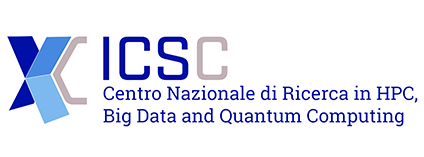
ICSC This work was supported by the following two projects: the Spoke 1 “FutureHPC & BigData” of the ICSC – Centro Nazionale di Ricerca in “High-Performance Computing, Big Data and Quantum Computing,” funded by European Union – NextGenerationEU
Publications
Talks

Space Center of Excellence (EC HE, HORIZON-EUROHPC-JU-2021-COE-01): Scalable Parallel and distributed Astrophysical Codes for Exascale (2023, 48 months. total cost 8M€, G.A. 101093441)
Publications
Talks
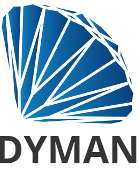
DYMAN (EC HE, HORIZON-EIC-2023-PATHFINDERCHALLENGES-01) Dynamically Managed Self-Cooling HPC Data Centers (2024, 36 months, total cost 4M€, G.A. 101161930)
Publications
Talks

EUMaster4HPC (EC H2020 RIA, EuroHPC-2020-03): HPC European Consortium Leading Education Activities (2022, 36 months, total cost 7M€, G.A. 101051997)
Publications
Talks

EPI (EC H2020 IA, EuroHPC-2020-02): The European Processor Initiative SGA2 (2022, 48 months, total cost 70M€, G.A. 101036168)
Publications
Talks
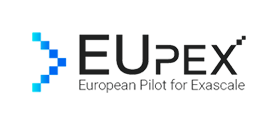
EUPEX (EC H2020 RIA, EuroHPC-02-2020): European Pilot for Exascale (2021, 48 months, total cost 41M€, G.A. n. 101033975)
Publications
Talks
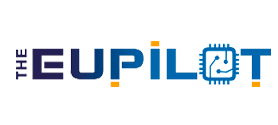
European Pilot (EC H2020 RIA, EuroHPC-02-2020, 42 months, total cost 30M€, G.A. n. 101034126)
Publications
Talks
Completed

Brainteaser (EC H2020 RIA, SC1-DTH-2020-1): BRinging Artificial INTelligencE home for a better cAre of amyotrophic lateral sclerosis and multiple SclERosis ( 2021, 48 months, total cost 5.9M€, G.A. 101017598)
Publications
Talks
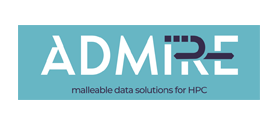
ADMIRE (EC H2020 RIA, EuroHPC-01-2019): Adaptive multi-tier intelligent data manager for Exascale (2021, 36 months, total cost 8M€, G.A. n. 956748)
Publications
Talks

TEXTAROSSA (EC H2020 RIA, EuroHPC-01-2019): Towards EXtreme scale Technologies and Accelerators for euROhpc hw/Sw Supercomputing Applications for exascale (2021, 36 months, total cost 6M€, G.A. n. 956831)
Publications
Talks
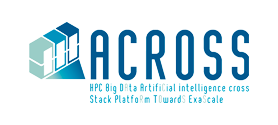
ACROSS (EC H2020 IA, EuroHPC-01-2019): HPC Big Data Artificial Intelligence cross-stack platform toward exascale (2021, 36 months, total cost 8M€, G.A. n. 955648)
Publications
Talks
- CTE-NEXT (Italian MISE): The house of emerging technologies of Torino (2021, 48 months, total cost 14.5M€) including the novel laboratory HPC4AI-CC: HPC4AI Compute Continuum
- EPI-TO (Univ. Torino infrastructure funding): The European Processor Initiative a University of Torino (2022, 12 months, total cost 250k€)
- Circular Health (Compagnia di San Paolo): Circular Health for Industry (2021, 36 months, total cost 1M€)
- QWaaS (CINECA ISCRA-C): Quantum Workflows as a Service (2021, 9 months)
- Mnemocomputing (Compagnia di San Paolo): In-Transit HPC computing (2019, 24 months, total cost 75k€)
- BehAPI (EC H2020 RISE, H2020-MSCA-RISE-2018) Behavioral Application Programming Interfaces (2018, 48 months, total cost 740k€, G.A. 778233).
- SAPERI (Regione Piemonte PRISM-E): Simulazione Accelerata su Piattaforme Eterogenee di Rilasci Incidentali in atmosfera (2021, 24 months, total cost 300k€)
- DeepHealth (EC H0202 IA, ICT-2018-11): Deep-Learning and HPC to Boost Biomedical Applications for Health (2019, 36 months, total cost 14.8M€, G.A. 825111)
- HPC4AI (Regione Piemonte, POR FESR Regione Piemonte): Turin’s centre in High-Performance Computing for Artificial Intelligence (2018, 24 months, total cost 4.5M€)
- C3S: Competence Center on Scientific Computing (2016, Compagnia di San Paolo, total cost 900k€)
- HiPEAC (EC-NoE, 7th FP & H2020) European Network of Excellence on High Performance and Embedded Architecture and Compilation (2012-now).
- cHiPSet (EC-COST Action IC1406): High-Performance Modelling and Simulation for Big Data Applications (2015, 48 months)
- Toreador (EC-RIA, H2020, ICT-2015-16): TrustwOrthy model-awaRE Analytics Data platfORm (2015, 36 months, total cost 6.2M€)
- OptiBike (EC I4MS): Robust Lightweight Composite Bicycle design and optimization, an experiment of EU i4MS Fortissimo2 project (2017, 24 months, total cost 230K€)
- Rephrase (EC-RIA, H2020, ICT-2014-1): Refactoring Parallel Heterogeneous Resource-Aware Applications – a Software Engineering Approach (2015, 36 months, total cost 3.5M€).
- NESUS (EC-COST Action IC1305): Network for Sustainable Ultrascale Computing (2014, 48 months)
- DIMA-HUB (EU I4MS): Regional Digital Manufacturing Innovation Hub (2016, 6 months)
- REPARA (EC-STREP, 7th FP): Reengineering and Enabling Performance And poweR of Applications (2013, 36 months, total cost 3.5M€)
- CINA (MIUR PRIN): Compositionality, Interaction, Negotiation, Autonomicity for the future ICT society (2013, 36 months)
- BETTY (EC-COST Action1201): Behavioural Types for Reliable Large-Scale Software Systems. (2012, 48 months)
- ParaPhrase (EC-STREP, 7th FP): Parallel Patterns for Adaptive Heterogeneous Multicore Systems (2011, 42 months, total cost 4.2M€)
- SALT (founded by Compagnia di San Paolo): Self-adaptive, Autonomic, Light Types (2013-2015)
- IMPACT (founded by Compagnia di San Paolo): Innovative Methods for Particle Colliders at the Terascale (2012, 36 months)
- IPODS (MIUR PRIN): Interacting Processes in Open-ended Distributed Systems (2009, 24 months)
- BioBITs (founded by Regione Piemonte): Developing white and green biotechnologies by converging platforms from biology and information technology towards metagenomics (2009, 36 months)
- MyMED (EC Italy-France cooperation (Alpi)): myMed: a transnational computer network for content sharing on desktop and mobile clients (2010, 36 months)
Industrial cooperations
- IBM Joint Study Agreement: Spark optimisation (2015-2018)
- Noesis Solutions: Parallel machine learning techniques for engineering (2015-2018)
- A3CUBE: FastFlow/PGAS with in memory fabric (2014-2018)
- NVidia Corp: CUDA Research Center at University of Torino (2013-2016)
Older projects (at University of Pisa)
- INSYEME (Italian MIUR, FIRB): Integrated System for Emergency (2007, 36 months)
- FRIMP (Fondazione Cassa di Risparmio di Pisa): Design of a development framework for Network Processors (2007, 36 months)
- GridComp (EC 6th FP STREP): Grid programming with Components (2006, 30 months)
- SFIDA (Italian MIUR, FAR-ICT): Information Science Solutions for Supply-Chains, Districts and Associations of Small and Medium Enterprises (2006, 30 months)
- VirtuaLinux (Eurotech SpA): Virtualized high-density clusters with no single point of failure (2006, 6 months)
Read More
- CoreGrid (EC 6th FP NoE): Foundations, Software Infrastructures and Applications for large scale distributed, Grid and Peer-to-Peer Technologies (2004, 4 years)
- BEinGRID (EC 6th FP IP): The Grid infrastructure for the Retail Management Experiment (2006, 18 months)
- GridCoord (EC 6th FP Special Action): ERA Pilot on Co-ordinated Europe-wide initiative in Grid Research (2005, 18 months)
- Grid.it (Italian MIUR, FIRB): Piattaforme abilitanti per griglie computazionali ad elevate prestazioni orientate a organizzazioni virtuali scalabili (2003, 4 years)
- MOPROSCO Pisa-ParisVII/INRIA (INRIA, France): Functional programming and scientific computing (2005, 2 years)
- Galileo Pisa- ParisVI: Italy-France researchers exchange programme (2005, 2 years)
- Vigoni Pisa- Berlin/Muenster: Italy-Germany researchers exchange programme (2003, 2 years)
- SAIB (Italian MIUR, Industrial Research): Internet-based Banking (2001, 3.5 years)
- Progetti strategici legge 449/97 anno 2000 (Italian MIUR): High-performance Components for Data/Web Mining and Search Engines (2003, 2 years)
- Progetti strategici legge 449/97 anno 1999 (Italian MIUR-CNR): Grid Computing: E-science Enabling Technologies and Applications (2002, 2 years)
- ASI-PQE 2000 (Italian MIUR): ASSIST design and development (2002, 2 years)
- Vigoni Pisa-Passau: Italy-Germany researchers exchange programme (1998, 2 years)
- MOSAICO (Italian MIUR, 40%): High-Performance Computing on clusters of workstations(1996, 2 years)
- PQE2000 (Italian CNR, ENA, INFN, Alenia Spazio): SkIE compiler design and development (1996, 4 years)
- CNR Agenzia2000 (Italian MIUR-CNR): Design of an environment for parallel programming based on the structured parallelism paradigm